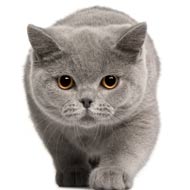
Durham constabulary looks into recruiting the UK’s first police cat
Durham Police could soon be the first constabulary in the UK to introduce police cats, following a little girl’s letter to the chief constable asking why there are no felines on patrol.
Five-year-old Eliza Damson-Hopper wrote to Durham Police chief Mike Barton suggesting the police should use cats as well as dogs to fight crime.
She received a reply saying he would ask his inspector who is in charge of police dogs ‘to think about the idea’.
The force has since confirmed that it will consider using cats in a not-yet-specified role.
Inspector Richie Allen, of the dog support unit, told BBC News: "I can confirm the force is looking into recruiting what we believe to be the first UK police cat.
"Their duties and responsibilities have not yet been agreed but if nothing else they will become the force mascot. Of course, if it smells a rat we'll expect it to catch it."
Eliza owns a cat called Mittens and a dog called Susie. Together with her mother, Cheryl Damson from Country Durham, she typed out a letter to the chief constable.
It read: “A police cat would be good as they have good ears and can listen out for danger. Cats are good at finding their way home and could show policemen the way. Cats are good at climbing trees and hunting and could rescue people that are stuck.”
Mr Barton replied saying that he always liked cats and drew a picture of his cat Joey on the back of the letter.



 FIVP has shared a survey, inviting those working in independent practice to share their views on the CMA's proposed remedies.
FIVP has shared a survey, inviting those working in independent practice to share their views on the CMA's proposed remedies.